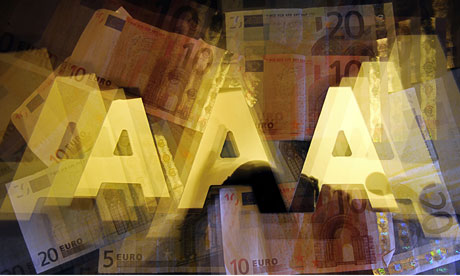The world hasn't ended, but global leaders will still have to work hard to manage economic trials and social tensions

‘The eurozone is
entering a make or break year, with the social fabric of the periphery
countries stretched to the limit.' Illustration: Andrzej Krauze
The world did not end
this year, as some people thought it would following a Mayan prophecy
(well, at least one interpretation of it), but it seems pretty certain
that next year is going to be tougher than this one.
We are entering 2013 as the Republican hardliners in the United States Congress does its utmost to weaken the federal government, using an anachronistic law on federal debt ceiling. Until the Republicans started abusing it recently, the law had been defunct in all but name. Since its enactment in 1917, the ceiling has been raised nearly a hundred times, as a ceiling set in nominal monetary terms becomes quickly obsolete in an ever-growing economy with inflation. Had the US stuck to the original ceiling of $11.5bn, its federal debt today would have been equivalent not even to 0.1% of GDP (about $15tn) – the current debt, which is supposed to hit the $16.3tn ceiling today, is about 110% of GDP.
A compromise will be struck in due course (as it was in 2011), but the debt ceiling will keep coming back to haunt the country because it is the best weapon with which the extremists in the Republican party can advance their anti-state ideology. This ideology has such a hold on American politics because it taps into the anxiety of the majority of the white population. Being squeezed from the top by greedy corporate elite and from the bottom by new immigrants, they seek solace in an ideology that harks back to the lost golden age of (idealised) 18th-century America, made up of self-defending (with guns), free-contracting (white) individuals who are independent of the central government. Unless mainstream American politicians can offer these people an alternative vision, backed up by more secure jobs and a better welfare system, they will keep voting for the extremists.
Meanwhile, on the other side of the Atlantic, the eurozone is entering a make or break year, with the social fabric of the periphery countries stretched to the limit. With its GDP 20% lower than in 2008, with 25% unemployment rate and with the wages of most of those still in work down by 40% to 50%, it is a real touch and go whether the current Greek government can survive another round of austerity. Spain and Portugal are not yet where Greece is, but they are hurtling down that way. And even the infinitely patient Irish are beginning to vent their anger against the inequities of the austerity programme that has hit the poorest the hardest. Should any of these countries socially explode, the consequences could be dire, whether they technically stayed in the eurozone or not.
As for the UK, 2013 may become the year when it sets a dubious world record of having an unprecedented "triple-dip recession". Even if that is avoided, with high unemployment, real wages that are at best stagnant and swingeing welfare cuts, many people will struggle to make ends meet. In a letter to the Observer yesterday, the leaders of the city councils of Newcastle, Liverpool and Sheffield, have even warned of a "break-up of civil society", should the austerity programme continue.
European leaders need to work out new economic programmes with a more equitable sharing of the burden of adjustment, both within and between countries. Paradoxically, they can look towards Iceland, the canary that first died in the mine of toxic debt, for a lesson. The country has been recovering rather well, considering the scale of the banking crisis, while making spending cuts in a way that impose the least burden on the poorest: between 2008 and 2010, income of the poorest 10% fell by 9% while that of the richest 10% fell by 38%.
Things look brighter in the Asian countries, with their economies growing much faster and with even Japan ready to make a dash for growth through more relaxed monetary and fiscal policies. However, they – especially the two giants of China and India – have their own shares of social tension to manage.
Growth is slowing down in China. It is estimated to have grown by 7.5% in 2012, well below the usual rate of 9% to 10%. Some forecast that its growth rate will pick up again to above 8% in 2013, but others believe it will fall below 7%. Given the country's heavy reliance on exports to the US and the European Union, the more pessimistic scenario seems likely, as things don't look very good in those economies. With slower economic growth it will become more difficult to manage the social tension that has been bubbling up thanks to runaway inequality and high levels of corruption.
Management of social tension will be an even bigger challenge for India. Its economic growth has significantly slowed down since 2010, and few predict a major reversal of the trend in 2013. Add to this economic difficulty deepening economic, religious and cultural divisions, and you have a heady mixture, as we see in the social unrest following the recent gang rape and death of a young medical student.
If the political leaders of the major economies do not manage these social tensions well, 2013 could be a year in which the world takes a turn for the worse. It is a huge challenge, as it is like trying to fix a car while driving it. However, without fixing the malfunctioning car, we will not get out of the woods, however much extra fuel, like quantitative easing, we pour into the car.
We are entering 2013 as the Republican hardliners in the United States Congress does its utmost to weaken the federal government, using an anachronistic law on federal debt ceiling. Until the Republicans started abusing it recently, the law had been defunct in all but name. Since its enactment in 1917, the ceiling has been raised nearly a hundred times, as a ceiling set in nominal monetary terms becomes quickly obsolete in an ever-growing economy with inflation. Had the US stuck to the original ceiling of $11.5bn, its federal debt today would have been equivalent not even to 0.1% of GDP (about $15tn) – the current debt, which is supposed to hit the $16.3tn ceiling today, is about 110% of GDP.
A compromise will be struck in due course (as it was in 2011), but the debt ceiling will keep coming back to haunt the country because it is the best weapon with which the extremists in the Republican party can advance their anti-state ideology. This ideology has such a hold on American politics because it taps into the anxiety of the majority of the white population. Being squeezed from the top by greedy corporate elite and from the bottom by new immigrants, they seek solace in an ideology that harks back to the lost golden age of (idealised) 18th-century America, made up of self-defending (with guns), free-contracting (white) individuals who are independent of the central government. Unless mainstream American politicians can offer these people an alternative vision, backed up by more secure jobs and a better welfare system, they will keep voting for the extremists.
Meanwhile, on the other side of the Atlantic, the eurozone is entering a make or break year, with the social fabric of the periphery countries stretched to the limit. With its GDP 20% lower than in 2008, with 25% unemployment rate and with the wages of most of those still in work down by 40% to 50%, it is a real touch and go whether the current Greek government can survive another round of austerity. Spain and Portugal are not yet where Greece is, but they are hurtling down that way. And even the infinitely patient Irish are beginning to vent their anger against the inequities of the austerity programme that has hit the poorest the hardest. Should any of these countries socially explode, the consequences could be dire, whether they technically stayed in the eurozone or not.
As for the UK, 2013 may become the year when it sets a dubious world record of having an unprecedented "triple-dip recession". Even if that is avoided, with high unemployment, real wages that are at best stagnant and swingeing welfare cuts, many people will struggle to make ends meet. In a letter to the Observer yesterday, the leaders of the city councils of Newcastle, Liverpool and Sheffield, have even warned of a "break-up of civil society", should the austerity programme continue.
European leaders need to work out new economic programmes with a more equitable sharing of the burden of adjustment, both within and between countries. Paradoxically, they can look towards Iceland, the canary that first died in the mine of toxic debt, for a lesson. The country has been recovering rather well, considering the scale of the banking crisis, while making spending cuts in a way that impose the least burden on the poorest: between 2008 and 2010, income of the poorest 10% fell by 9% while that of the richest 10% fell by 38%.
Things look brighter in the Asian countries, with their economies growing much faster and with even Japan ready to make a dash for growth through more relaxed monetary and fiscal policies. However, they – especially the two giants of China and India – have their own shares of social tension to manage.
Growth is slowing down in China. It is estimated to have grown by 7.5% in 2012, well below the usual rate of 9% to 10%. Some forecast that its growth rate will pick up again to above 8% in 2013, but others believe it will fall below 7%. Given the country's heavy reliance on exports to the US and the European Union, the more pessimistic scenario seems likely, as things don't look very good in those economies. With slower economic growth it will become more difficult to manage the social tension that has been bubbling up thanks to runaway inequality and high levels of corruption.
Management of social tension will be an even bigger challenge for India. Its economic growth has significantly slowed down since 2010, and few predict a major reversal of the trend in 2013. Add to this economic difficulty deepening economic, religious and cultural divisions, and you have a heady mixture, as we see in the social unrest following the recent gang rape and death of a young medical student.
If the political leaders of the major economies do not manage these social tensions well, 2013 could be a year in which the world takes a turn for the worse. It is a huge challenge, as it is like trying to fix a car while driving it. However, without fixing the malfunctioning car, we will not get out of the woods, however much extra fuel, like quantitative easing, we pour into the car.

